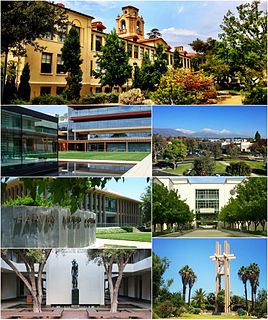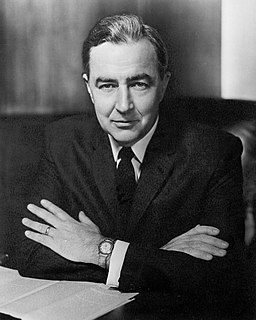
The Claremont Colleges are a consortium of seven highly selective private institutions of higher education located in Claremont, California, United States. They comprise five undergraduate colleges — Pomona College, Scripps College, Claremont McKenna College (CMC), Harvey Mudd College, and Pitzer College — and two graduate schools — Claremont Graduate University (CGU) and Keck Graduate Institute (KGI). All of the members except KGI have adjoining campuses that together cover roughly 1 square mile (2.6 km2).

Eugene Joseph McCarthy was an American politician and poet from Minnesota. He served in the United States House of Representatives from 1949 to 1959 and the United States Senate from 1959 to 1971. McCarthy sought the Democratic nomination in the 1968 presidential election, challenging incumbent Lyndon B. Johnson on an anti-Vietnam War platform. McCarthy sought the presidency five times, but never won.

Claremont McKenna College (CMC) is a private liberal arts college in Claremont, California. It has a curricular emphasis on economics, finance, international relations, government and public affairs. CMC is a member of the Claremont Colleges consortium.

The Judicial Procedures Reform Bill of 1937 was a legislative initiative proposed by U.S. President Franklin D. Roosevelt to add more justices to the U.S. Supreme Court in order to obtain favorable rulings regarding New Deal legislation that the Court had ruled unconstitutional. The central provision of the bill would have granted the President power to appoint an additional Justice to the U.S. Supreme Court, up to a maximum of six, for every member of the court over the age of 70 years and 6 months.

The Claremont Institute is an American conservative think tank based in Upland, California. The institute was founded in 1979 by four students of Harry V. Jaffa. The Institute publishes the Claremont Review of Books, a quarterly journal of political thought and statesmanship, as well as other books and publications.
Progressivism in the United States is a political philosophy and reform movement that reached its height early in the 20th century. Middle class and reformist in nature, it arose as a response to the vast changes brought by modernization such as the growth of large corporations, pollution and fears of corruption in American politics. In the 21st century, progressives continue to embrace concepts such as environmentalism and social justice. While the modern progressive movement may be characterized as largely secular in nature, by comparison, the historical progressive movement was to a significant extent rooted in and energized by religion.

Donald Carnegie McKenna was an American businessperson and philanthropist. He is best remembered as a founder of and major donor to the Claremont McKenna College, a liberal arts college and member of the Claremont Colleges, located in Claremont, California.
Jack L. Stark was president of Claremont McKenna College in Claremont, California from 1970 to 1999. He followed the short-lived tenure of CMC's second president, Howard R. Neville (1969-1970), being followed himself by CMC's fourth and fifth presidents, Pamela Brooks Gann (1999-2013) and Hiram E. Chodosh. At the time of his retirement, Stark was the longest serving college president in the state of California.
Elliot E. "Spike" Maynard was an American lawyer and former judge from West Virginia. In 1996 he was elected as a Democrat to the Supreme Court of Appeals of West Virginia. A judge of West Virginia's 30th Judicial Circuit for over 16 years, he was elected as a Democrat to a 12-year term on the Supreme Court of Appeals of West Virginia in 1996.
Jonathan Petropoulos is an American historian who writes about National Socialism and, in particular, the fate of art looted during World War II. He is John V. Croul Professor of European History at Claremont McKenna College in Claremont, California. Before his 1999 appointment to Claremont McKenna College, Petropoulos taught at Loyola College in Maryland.
Ross Doud Eckert was the Boswell Professor of Economics and Legal Organization at Claremont McKenna College, the faculty of which he joined in 1979. He received his degrees from UCLA. He was one of the first to warn of the threat that AIDS posed to the blood supply, and a major goal in his life was cleaning up the blood supply. The matter affected him personally as he was a hemophiliac who contracted HIV/AIDS from a transfusion. He was also a member of the Mont Pelerin Society. Eckert worked with Ward Elliott on market-incentives to reduce congestion. He also worked to rescue the U.S. Laws of the Sea from degradation.
Eric Helland is a Professor, Robert Day School of Economics and Finance, at Claremont McKenna College and Claremont Graduate University, and Senior Economist, Institute for Civil Justice, RAND Corporation, Santa Monica, CA.

The Robert Day School of Economics and Finance (RDS) at Claremont McKenna College is an economics school, and the only graduate program at Claremont McKenna College. The Robert Day School emphasizes coursework that blends theory and practice. The undergraduate programs offer majors in economics and economics-accounting, and a sequence in financial economics. RDS also offers a specialized full-time master's degree in finance as well as administering the Robert Day Scholars Program. In contrast to any other liberal arts college, the offerings include a broad spectrum of core and elective courses in finance and accounting. The course is designed to develop the individual student's analytical, quantitative, and communication skills—all of which are critical to the cultivation of leadership skills.

Roderic Ai Camp is an American academic specialized in Mexican studies. He is a frequent consultant to international media including the BBC, The New York Times, The Wall Street Journal, National Public Radio, and was once a contributing editor to Microsoft Encarta.
Kenneth P. Miller is a professor of Government at Claremont McKenna College specializing in California politics, direct democracy, and state constitutional law. Miller is the Associate Director of the Rose Institute of State and Local Government, a research institute known for its expertise in redistricting, elections, demographic research, and public policy analysis. In 2011-2012, Miller served as the Ann and Herbert W. Vaughan Visiting Fellow at Princeton University's James Madison Program in American Ideals and Institutions.
The Kravis Prize or Henry R. Kravis Prize in Nonprofit Leadership is a philanthropic award for leaders in the nonprofit sector. According to Bloomberg News, the prize "honor[s] those who have demonstrated 'bold leadership' in the nonprofit sector and have shared their best practices with others."
Harold William "Bill" Rood was a political scientist and author of Kingdoms of the Blind. He was Professor Emeritus at Claremont McKenna College and taught International Relations and national security affairs beginning in 1962. Rood was also a fellow at the Claremont Institute and published articles in the Claremont Review of Books. He received the Claremont Institute's Salvatori Prize in the American Founding in 2007 and taught in the Claremont Institute's Publius Fellows Program since 1979.

Stephen Brock Blomberg is the 17th president of Ursinus College. A macroeconomist and former Professor of economics at Claremont McKenna College, Blomberg is best known in academia for his work on the economics of terrorism.
Peter Uvin is a Belgian-born American political scientist. He is a professor of Government at Claremont McKenna College, where he is also the vice president for academic affairs and dean of faculty. He is the author of four books, including Aiding Violence: The Development Enterprise in Rwanda, which won the Herskovits Prize of the African Studies Association in 1999.